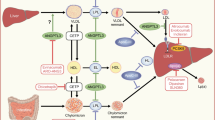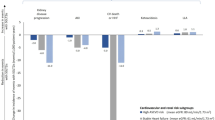Abstract
Objective: To evaluate the efficacy and tolerability of pioglitazone in patients with type 2 diabetes mellitus treated in general practice settings.
Design and setting: This was a postmarketing surveillance study involving 2537 primary-care physicians throughout Germany.
Patients and interventions: A total of 8760 patients with type 2 diabetes were treated with pioglitazone 15 or 30mg once daily and followed for 16 weeks.
Results: Treatment with pioglitazone 15 or 30mg once daily was associated with a reduction in both fasting plasma glucose (mean 50.1 mg/dL) and glycosylated haemoglobin (HbA1c) [mean 1.4%] compared with baseline. The proportion of patients with ‘normal’ fasting glucose levels (70–110 mg/dL) increased from 2.3% at baseline to 24.2% at the final evaluation. Pioglitazone therapy was associated with a reduction in levels of triglycérides, total cholesterol and low-density lipoprotein (LDL)-cholesterol, and an increase in levels of high-density lipoprotein (HDL)-cholesterol. The proportion of patients at high risk of developing vascular complications decreased progressively during pioglitazone therapy according to a number of parameters.
Conclusions: Pioglitazone was well tolerated and effective in improving glycaemic control and lipid profiles in patients with type 2 diabetes. Pioglitazone may be effective in reducing the risk of vascular complications of diabetes.






Similar content being viewed by others
Notes
1The use of tradenames is for product identification purposes only and does not imply endorsement.
References
International Diabetes Federation. Diabetes facts & figures [online]. Available from URL: http://www.idf.org. [Accessed 2003 May]
Hogan P, Dall T, Nicolau P. American Diabetes Association —economic costs of diabetes in the US in 2002. Diabetes Care 2003; 26: 917–32
Mokdad AH, Bowman BA, Ford ES, et al. The continuing epidemics of obesity and diabetes in the United States. JAMA 2001; 286: 1195–200
Jonsson B. Revealing the cost of type II diabetes in Europe. Diabetologia 2002; 45: S5–12
Bagust A, Hopkinson PK, Maslove L, et al. The projected health care burden of type 2 diabetes in the UK from 2000 to 2060. Diabet Med 2002; 19Suppl. 4: 1–5
DCCT. The effect of intensive treatment of diabetes on the development and progression of long-term complications in insulin-dependent diabetes mellitus: The Diabetes Control and Complications Trial Research Group. N Engl J Med 1993; 329: 977–86
UK Prospective Diabetes Study (UKPDS) Group. Intensive blood-glucose control with sulphonylureas or insulin compared with conventional treatment and risk of complications in patients with type 2 diabetes (UKPDS 33). Lancet 1998; 352: 837–53
Aronoff S, Rosenblatt S, Braithwaite S, et al. Pioglitazone hydrochloride monotherapy improves glycemic control in the treatment of patients with type 2 diabetes: a 6-month randomized placebo-controlled dose-response study: The Pioglitazone 001 Study Group. Diabetes Care 2000; 23: 1605–11
Einhorn D, Rendell M, Rosenzweig J, et al. Pioglitazone hydrochloride in combination with metformin in the treatment of type 2 diabetes mellitus: a randomized, placebo-controlled study. The Pioglitazone 027 Study Group. Clin Ther 2000; 22: 1395–409
Kipnes MS, Krosnick A, Rendell MS, et al. Pioglitazone hydrochloride in combination with sulfonylurea therapy improves glycemic control in patients with type 2 diabetes mellitus: a randomized, placebo-controlled study. Am J Med 2001; 111: 10–7
Scherbaum WA, Goke B. Metabolic efficacy and safety of once-daily pioglitazone monotherapy in patients with type 2 diabetes: a double-blind, placebo-controlled study. Horm Metab Res 2002; 34: 589–95
Rosenstock J, Einhorn D, Hershon K, et al. Efficacy and safety of pioglitazone in type 2 diabetes: a randomised, placebocontrolled study in patients receiving stable insulin therapy. Int J Clin Pract 2002; 56: 251–7
Khan MA, St Peter JV, Xue JL. A prospective, randomized comparison of the metabolic effects of pioglitazone or rosiglitazone in patients with type 2 diabetes who were previously treated with troglitazone. Diabetes Care 2002; 25: 708–11
Baba S. Pioglitazone: a review of Japanese clinical studies. Curr Med Res Opin 2001; 17: 166–89
Gegick CG, Altheimer MD. Comparison of effects of thiazolidinediones on cardiovascular risk factors: observations from a clinical practice. Endocr Pract 2001; 7: 162–9
Boyle PJ, King AB, Olansky L, et al. Effects of pioglitazone and rosiglitazone on blood lipid levels and glycemie control in patients with type 2 diabetes mellitus: a retrospective review of randomly selected medical records. Clin Ther 2002; 24: 378–96
Buchanan TA, Meehan WP, Jeng YY, et al. Blood pressure lowering by pioglitazone: evidence for a direct vascular effect. J Clin Invest 1995; 96: 354–60
Fullert S, Schneider F, Haak E, et al. Effects of pioglitazone in nondiabetic patients with arterial hypertension: a double-blind, placebo-controlled study. J Clin Endocrinol Metab 2002; 87: 5503–6
Hanefeld M, Belcher G. Safety profile of pioglitazone. Int J Clin Pract Suppl 2001; 121: 27–31
Biermann E, Lübben G, Rihl J, et al. Micro- and macrovascular complications in insulin sensitive and insulin resistant diabetic patients: The IRIS Study. Diabetes 2002; 51Suppl. 2: 1759
Guidelines for Diabetes Care: European Diabetes Policy Group 1998, International Diabetes Federation, European region. Exp Clin Endocrinol Diabetes 1998; 106: 240–69
Chilcott J, Tappenden P, Jones ML, et al. A systematic review of the clinical effectiveness of pioglitazone in the treatment of type 2 diabetes mellitus. Clin Ther 2001; 23: 1792–823
Chilcott J, Wight J, Lloyd Jones M, et al. The clinical effectiveness and cost-effectiveness of pioglitazone for type 2 diabetes mellitus: a rapid and systematic review. Health Technol Assess 2001; 5: 1–71
Chilcott J, Wight J, Lloyd Jones M, et al. The clinical effectiveness and cost-effectiveness of pioglitazone for type 2 diabetes mellitus: a rapid and systematic review. Health Technol Assess 2001; 5: 1–61
Coyle D, Palmer AJ, Tam R. Economic evaluation of pioglitazone hydrochloride in the management of type 2 diabetes mellitus in Canada. Pharmacoeconomics 2002; 20Suppl. 1: 31–42
Lambert C. Safety and tolerability of pioglitazone compared to metformin and gliclazide in type 2 diabetes. Results from active comparator trials. Diabetes 2003; 52Suppl. 1: 1949
Acknowledgements
This study was supported by Takeda GmbH, Aachen, Germany.
Author information
Authors and Affiliations
Corresponding author
Rights and permissions
About this article
Cite this article
Schöfl, C., Lübben, G. Postmarketing Surveillance Study of the Efficacy and Tolerability of Pioglitazone in Insulin-Resistant Patients with Type 2 Diabetes Mellitus in General Practice. Clin. Drug Investig. 23, 725–734 (2003). https://doi.org/10.2165/00044011-200323110-00005
Published:
Issue Date:
DOI: https://doi.org/10.2165/00044011-200323110-00005




